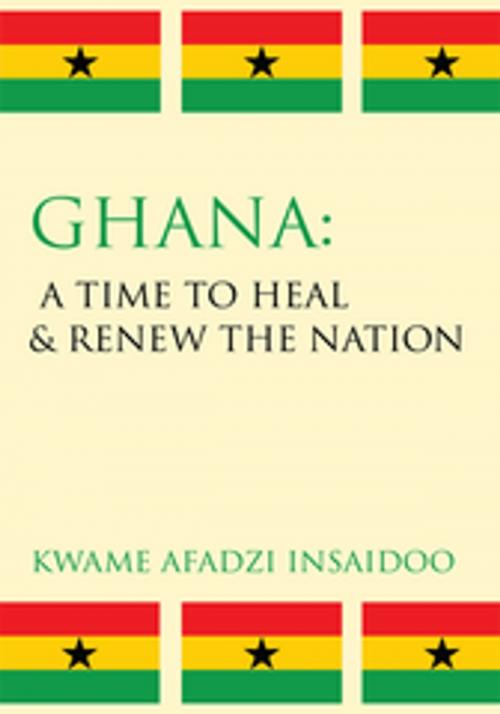Ghana: a Time to Heal & Renew the Nation
Nonfiction, Social & Cultural Studies, Social Science, Cultural Studies, Ethnic Studies, Political Science, History| Author: | Kwame Afadzi Insaidoo | ISBN: | 9781467090643 |
| Publisher: | AuthorHouse | Publication: | August 8, 2007 |
| Imprint: | AuthorHouse | Language: | English |
| Author: | Kwame Afadzi Insaidoo |
| ISBN: | 9781467090643 |
| Publisher: | AuthorHouse |
| Publication: | August 8, 2007 |
| Imprint: | AuthorHouse |
| Language: | English |
In this thought provoking book the author takes a critical retrospective glance at the political development of Ghana from its colonial past to the attainment of her sovereignty, and highlights the insidious fundamental flaws in the governance of the new nation.
He unequivocally asserts that the creation of a dysfunctional totalitarian governmental system, where a cadre of unseasoned politicians systematically arrogated all power to themselves, and zealously prosecuted their political adversaries into oblivion, constituted the most fatal fundamental flaw in the governance of the nation.
He points out that the militarys delusional belief in their self-appointed messianic role of liberating and redeeming Ghana from the odious dictatorship imposed on the people opened up the nation to the Pandoras box of bureaucratic ineptitude, gross power abuses, poorly conceived, and haphazardly implemented programs which precipitated political instability, stagnation, and decay of the institutions of state leading to the exodus of Ghanaians abroad.
The dominant theme that permeates throughout the book revolves around the prevalence of the underlying institutional malaise inherited from colonialpolitical structureswhich concentrate too much raw political powers in the hands of the presidency. This accumulation of near absolute power elevates our presidents to the status of benevolent dictators, and sotheir policies go virtually unchallenged.
This lack of checks and balances in our political system enabled the colonialists to totally exploit our people, andwhen our Ghanaian leaders governed our new nation in this same odious system they got the opportunity, like the colonial masters, to exploit and arrogate power to themselves, while utilizing the legal system as a weapon to harass their political opponents and silenced them.
The author argues that this incompatibility of the colonial system with the political development of modern Ghana is the root cause of our political polarization, endemic instability and pervasive poverty.
In this thought provoking book the author takes a critical retrospective glance at the political development of Ghana from its colonial past to the attainment of her sovereignty, and highlights the insidious fundamental flaws in the governance of the new nation.
He unequivocally asserts that the creation of a dysfunctional totalitarian governmental system, where a cadre of unseasoned politicians systematically arrogated all power to themselves, and zealously prosecuted their political adversaries into oblivion, constituted the most fatal fundamental flaw in the governance of the nation.
He points out that the militarys delusional belief in their self-appointed messianic role of liberating and redeeming Ghana from the odious dictatorship imposed on the people opened up the nation to the Pandoras box of bureaucratic ineptitude, gross power abuses, poorly conceived, and haphazardly implemented programs which precipitated political instability, stagnation, and decay of the institutions of state leading to the exodus of Ghanaians abroad.
The dominant theme that permeates throughout the book revolves around the prevalence of the underlying institutional malaise inherited from colonialpolitical structureswhich concentrate too much raw political powers in the hands of the presidency. This accumulation of near absolute power elevates our presidents to the status of benevolent dictators, and sotheir policies go virtually unchallenged.
This lack of checks and balances in our political system enabled the colonialists to totally exploit our people, andwhen our Ghanaian leaders governed our new nation in this same odious system they got the opportunity, like the colonial masters, to exploit and arrogate power to themselves, while utilizing the legal system as a weapon to harass their political opponents and silenced them.
The author argues that this incompatibility of the colonial system with the political development of modern Ghana is the root cause of our political polarization, endemic instability and pervasive poverty.















